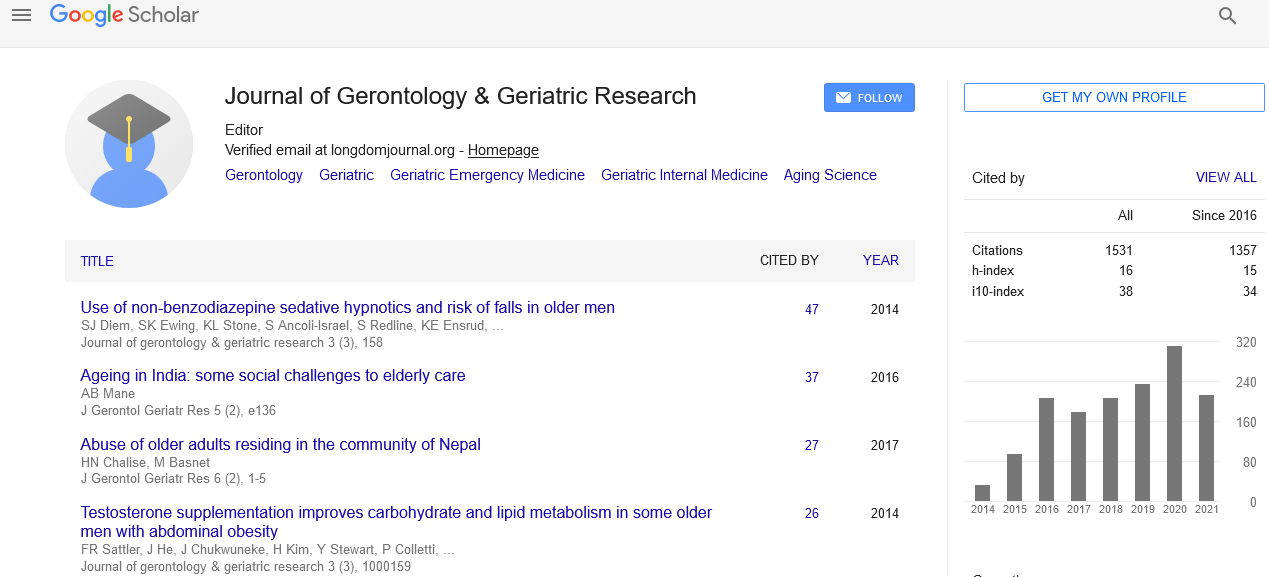PMC/PubMed Indexed Articles
Indexed In
- Open J Gate
- Genamics JournalSeek
- SafetyLit
- RefSeek
- Hamdard University
- EBSCO A-Z
- OCLC- WorldCat
- Publons
- Geneva Foundation for Medical Education and Research
- Euro Pub
- Google Scholar
Useful Links
Share This Page
Journal Flyer

Open Access Journals
- Agri and Aquaculture
- Biochemistry
- Bioinformatics & Systems Biology
- Business & Management
- Chemistry
- Clinical Sciences
- Engineering
- Food & Nutrition
- General Science
- Genetics & Molecular Biology
- Immunology & Microbiology
- Medical Sciences
- Neuroscience & Psychology
- Nursing & Health Care
- Pharmaceutical Sciences
Randomized controlled trial of a prehospital decision system by emergency medical services to ensure optimal treatment for older adults in Sweden
International Conference on Geriatrics & Gerontology
July 08-10, 2014 DoubleTree by Hilton Hotel Chicago-North Shore Conference Center, USA
Veronica Vicente, Leif Svensson, BirgittaWireklint Sundstr?m, Fredrik Sj?strand and Maaret Castren
Scientific Tracks Abstracts: J Gerontol Geriat Res
Abstract:
Objectives: To evaluate the feasibility and appropriateness of a prehospital system allowing ambulance nurses to transport older adults directly to geriatric care at a community-based hospital (CH) or to an emergency department (ED). Design: Randomized controlled trial. Setting: Emergency medical services in Stockholm, Sweden. Participants: Older adults who called the emergency number were randomized to an intervention group (n=410) or a control group (n=396). Intervention: The dispatcher randomized the individuals. Those randomized to the intervention group were transported to several alternative destinations decided by a trained nurse performing a comprehensive assessment, using the new prehospital system. Those randomized to the control group were transported to the ED. Measurements: Primary endpoint: Number of individuals triaged directly to a CH (feasibility). Secondary endpoint: Number of subsequent transfers (appropriateness) from CH to ED within 24 hours after initial admission. Results: After exclusion and cross-over, the control group consisted of 217 and the intervention group of 449 older adults. The nurse send 20% of the intervention group (90/449) (95% confidence interval (CI)=16.6?24.0) directly to the CH when using the prehospital system. Six of those individuals (6.7%) (95% CI=3.1?13.8) were subsequently transferred from the CH to the ED. Overall, the nurse appropriately triaged 93.3% of the participants (84/90) and transferred them to the CH, avoiding an ED visit. Conclusion: Ambulance nurses are able to send older adults to an alternative healthcare facility with the help of a prehospital decision support system. In this geographical setting, this appears to be a promising method to optimize resources and improve emergency care of elderly adults.
Biography :
Veronica Vicente has completed her PhD in 2013 from Karolinska Institute, Sweden. She worked as a nurse at the intensive care unit & in surgery and anesthesia & neonatal unit at Karolinska university hospital during 1996- 2010. She has been working as a Pre- hospital nurse at AISAB, Ambulance service in Stockholm from 2005. Currently she is the head, director of research and development department of the ambulance service in Stockholm.


